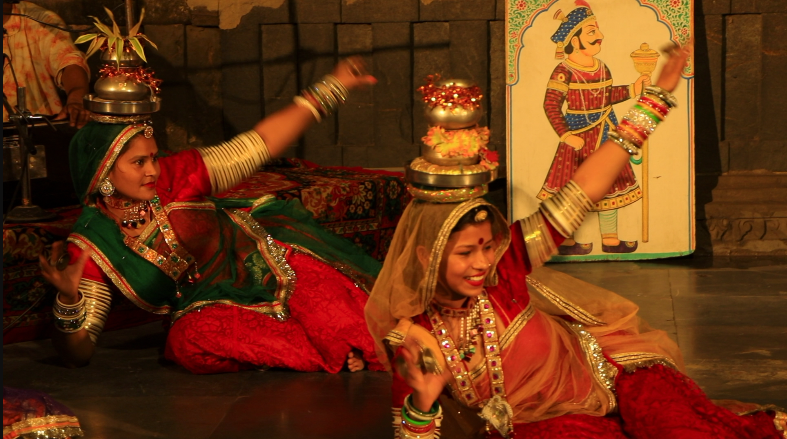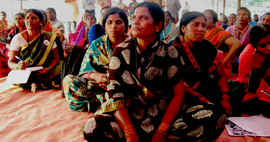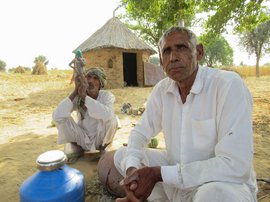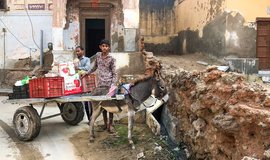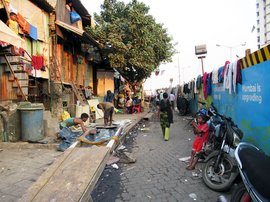At around 7 p.m., holding a ghagra embedded with silver-gold lace and glass pieces, Nirmala Devi ascends the stage in Udaipur’s Bagore ki Haveli. There, along with her daughter Tara and around eight other women – all related to each other – she starts performing the Chari dance, Ghoomar, Bhavai and other sequences.
“Dancing every day with the same energy is not easy,” she says. More so when carrying swords between your teeth or a lit oil lamp atop a metal vessel placed on the head, or dancing on pieces of glass or while balancing earthen pots on the head. And yet, Nirmala and the members of her troupe – including her sister-in-law Seema Devi and mother-in-law Bhamri Bai – do this every evening. “My sister-in-law carries 11 vessels on her head and by the end of it, she is sweating from head to toe,” Nirmala says. “Still, she keeps smiling on stage and goes back to the changing room to get ready for the next dance.”
But it’s the Terah Taali that the dancers’ community, Kamad (listed as a Scheduled Caste), is most known for. This 10-15 minute sequence, part of the one-hour performance at the Haveli, is a tribute to a local folk hero, a Baba Ramdev. Community legend says he devoted his life to helping the oppressed.The sequence evolved, Nirmala tells me, from a performance by the community during the nine days of the Navratri festival or when they sang bhajans and played the tanpura , dholak and manjira (brass cymbals) at temples. Terah Taali is performed with manjiras tied with rope on the bodies – on the legs, feet, hands – and played in 13 ( terah) different ways.
As a child, Nirmala would imitate her mother’s dance – in their village, Padarla, in Rajasthan’s Pali district, wearing the mini manjiras her mother had got made for her. She dropped out of school after Class 3 to go to melas , festivals and temples with her grandparents. Gradually, she too became a proficient dancer, and when she was 12, accompanied by her father’s father, a harmonium- dholak player and singer, performed on stage for the first time at the Pushkar mela near Ajmer. She would sing folk songs as well. “I did not take lessons or a class, our family would get together and we would all sing on festivals and in pujas. ” she says.
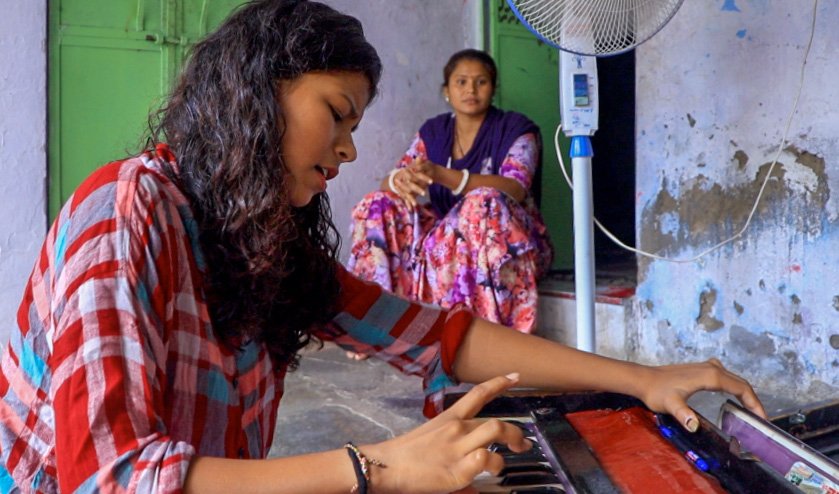
Off-stage, Tara and her mother Nirmala: 'I wish to hear the audience chanting my name one day when I go to the stage'
When she was 12, Nirmala's family arranged for her marriage to Khem Das Kamad, a singer and harmonium player from Dhol village in Gogunda tehsil. She went to live with him when she was 15. Their son, Shyam Das, is now 18. She was nine months pregnant with Tara Kumari, now 16, when her husband died in an accident. “Tara hasn’t seen her father, I’m all she has,” she says.
At that time, Nirmala and Khem Das had moved to Indore, where they performed in a hotel. After Khem Das's death, Nirmala's brother, who performed in a hotel in Ahmedabad, asked her to come there. After 12 years in Ahmedabad, Nirmala and her family moved to Udaipur four years ago.
The family lives in the old city of Udaipur in an old house arranged by Dharohar Folk Dance, the organisers of the show at Bagore ki Haveli, a state-run museum on the waterfront of Lake Pichola.
At Bagore ki Haveli, Nirmala and Tara earn Rs. 5,000 each per month. And from August to October, hotels in Udaipur invite the group to perform. Those are their busiest months. “We get Rs. 1,000 per person to perform for two to three hours [in other hotels],” she says. They get such show bookings around five times a month. “And when it’s in Delhi or somewhere far away, then we get around Rs. 3,000,” says Tara.
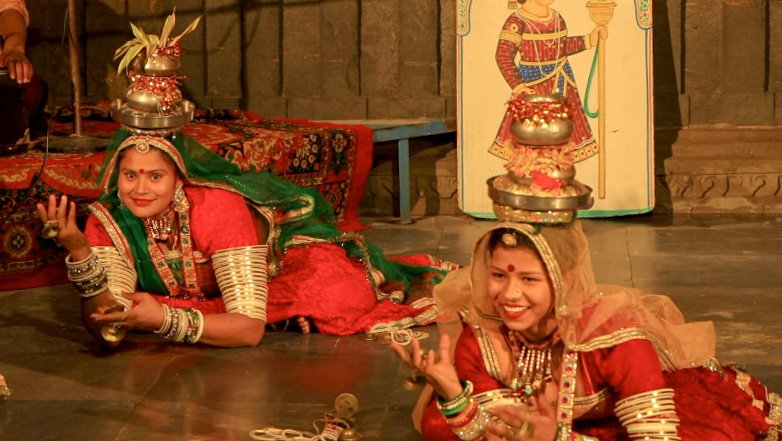
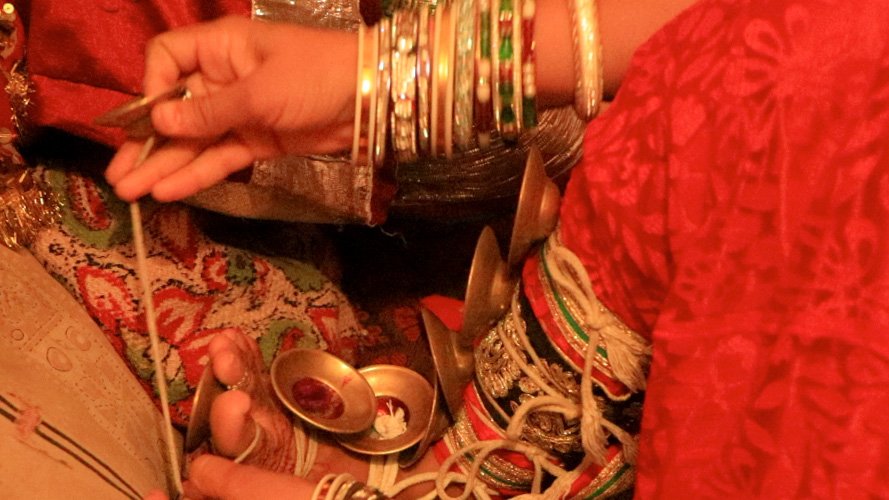
Dancing with pots, cymbals, swords, lamps and more
Various members of the troupe have also been abroad to perform, through an agent. During a month-long trip in 2014, one of two such tours she's been on, Nirmala says she performed in 12 countries – including Brazil, Cuba and the Netherlands.
Besides dancing, Tara also studies in Class 11 in a government school in Udaipur. Her optional subjects include music and painting. She says her teachers are proud that she has performed in various towns and cities. But some classmates look down upon her. “They cannot dance the way I can, they will never understand the art and only demean us. I forget all these problems while dancing, problems at home, everything,” she says.
Tara is also interested in singing “I wish to hear the audience chanting my name one day when I go to the stage. I don’t know if it is my father’s voice that I have inherited, but my family says so. When I think about it, being a good singer doesn’t seem difficult, I can get there,” she says.
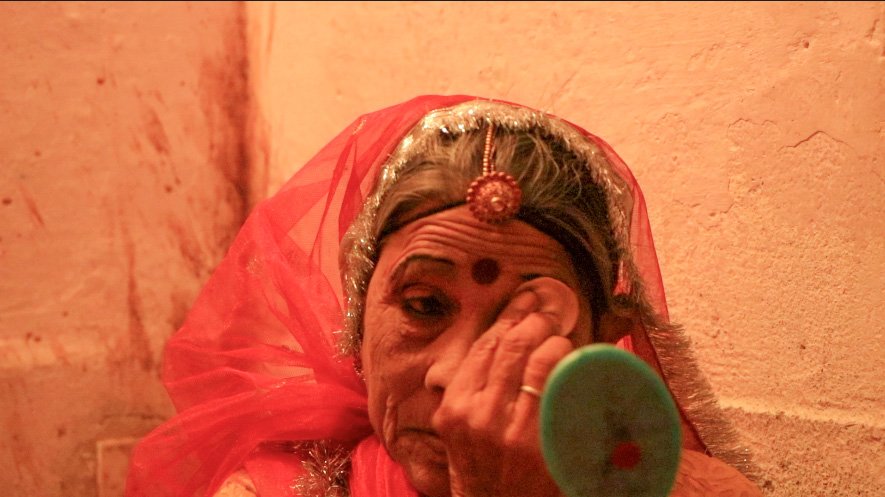
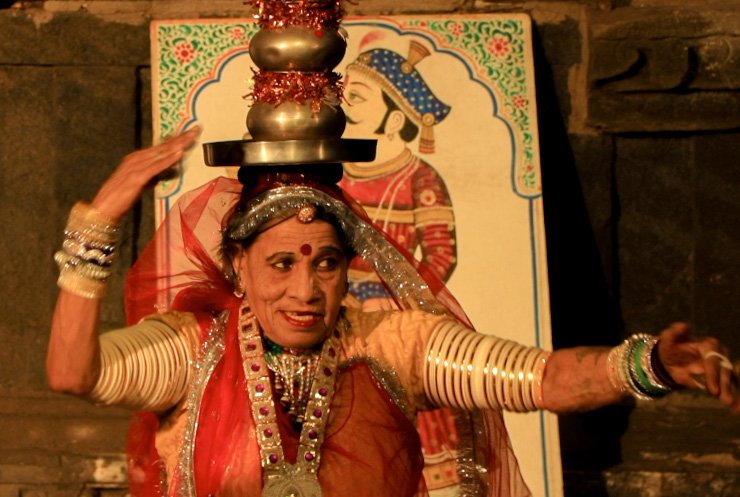
Bhamri Bai, Nirmala's mother-in-law, still performs at the age of 70, but Tara doesn’t want her mother to work once she’s as old as her grandmother
Nirmala wants her children to be educated. Her son is studying long-distance for a BA degree and wants to build a career in gym training. “Tara should continue to dance and sing but I think things are easier when you are educated,” Nirmala says. “I’m interested in singing but cannot remember all the verses, if I knew how to read and write, I could simply read from a piece of paper.”
In turn, Tara doesn’t want her mother to work once she’s as old as her grandmother. “Mummy should be able to stay home when she’s old, wear new clothes, and have tasty food.”
But Nirmala is unlikely to stay away from the stage for a long time. “During the day we feel dull,” she says. “But when it's time for us to get onto the stage, our spirits lift up.”
